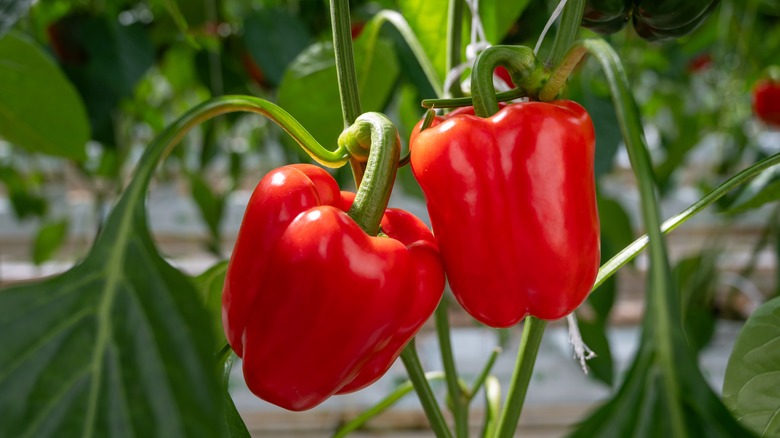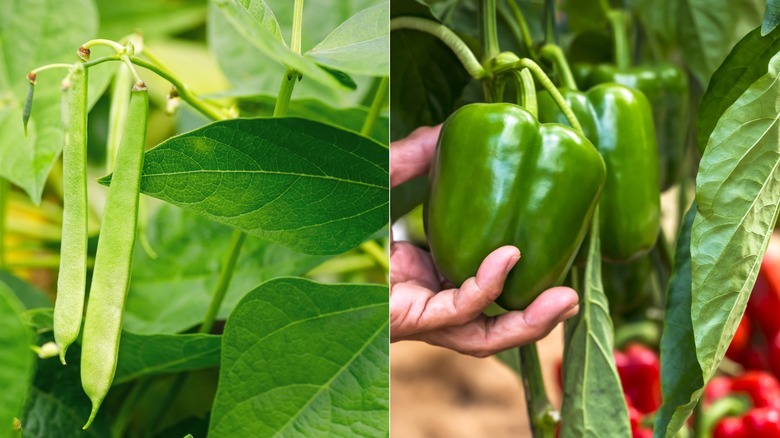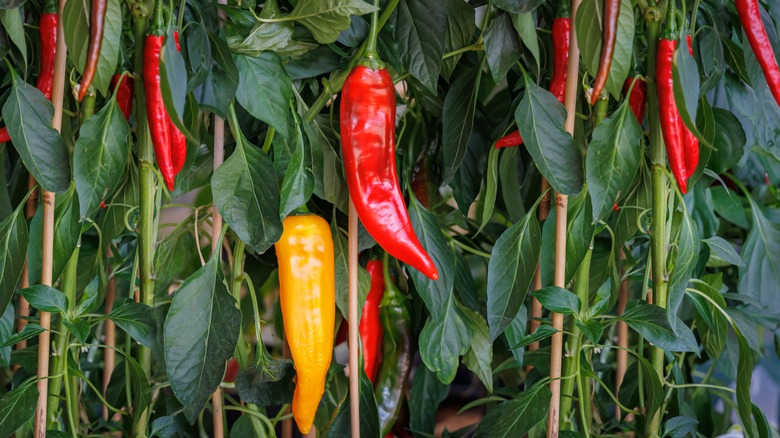You Have To Stop Planting Peppers And Beans Near Each Other And Here's Why
While companion planting isn't an exact science and many companion planting ideas have been passed down from one generation of gardeners to the next, there are scientific reasons why some plants should not be planted next to each other. One good example of a companion planting faux pas is beans and peppers, which should not be planted near each other. The main reason for this is that beans and peppers have very different nutritional requirements.
When considering companion planting, it's important to think about the growing conditions and nutrient requirements of the individual plants before you think about growing them next to each other. Plants that have similar needs, like sage and oregano or spinach and peas, easily grow well together. But the nutrient requirements of each plant varies. Some plants need high doses of nitrogen for optimum growth, while other plants need higher doses of different nutrients, such as potassium and phosphorus, to produce the parts that you want to harvest.
Although beans and peppers are both warm-season crops, their nutrient requirements are very different. Beans require lots of nitrogen while pepper plants will react with stunted growth if there's too much nitrogen in the soil.
The nutrient requirements of beans versus peppers
While using companion planting in your vegetable garden can be really useful in deterring pests, some plants should not be grown near each other if they have different nutrient requirements or they don't enjoy similar growing conditions. Beans and pepper plants vary in their need for different nutrients.
Beans are heavy feeders and need lots of nitrogen for healthy growth and bean production. In fact, beans have the ability to fix nitrogen to the soil. They do this by absorbing the nitrogen from the atmosphere. Around 80% of the atmosphere is nitrogen gas, and while most plants will absorb nitrogen from the atmosphere, this nitrogen is in a form that's not usable by many plants or other living organisms. But beans, clover, and other legumes have the ability to convert this atmospheric nitrogen into a usable form that can be absorbed by the plants growing nearby. They do this through a bacteria known as rhizobia that attaches to small growths on the roots called nodules. When the atmospheric nitrogen is converted into usable nitrogen, it's used by the bean plants and added into the surrounding soil. This is good for plants that require lots of nitrogen such as corn, spinach, lettuce, and other leafy greens. This is why peas and beans pair well with spinach in the garden. But this high level of nitrogen is not ideal for fruiting plants such as peppers.
Why too much nitrogen is not good for pepper plants
The primary reason it might not be a good idea to grow pepper plants near beans is because of the bean's ability to add nitrogen to the soil. This makes the nitrogen available to other plants that are growing nearby. But while all plants need nitrogen for growth, pepper plants need more potassium and phosphorus, and too much nitrogen can actually stunt their growth and inhibit fruit production. This is also the reason why pepper plants are one of the companion plants you should grow next to cucumbers in your garden – they both enjoy similar nutrients.
To prove nitrogen's negative effect on pepper plants, a graduate study conducted at the University of Illinois showed that excessive amounts of nitrogen in the soil not only stunts the growth of pepper plants but also reduces the fruit yield significantly, by about 50%. Another study, conducted by Purdue University, tried to find optimal nitrogen rates for bell peppers and Mountain Gem tomato. The study tested over 5,000 tomato plants and over 10,000 pepper plants and found that at the lowest nitrogen levels — 100 and 150 pounds of nitrogen per acre — each plant had their highest yield and largest growth. Yield and growth both got much worse the more nitrogen was added. For this reason, peppers don't thrive alongside nitrogen-fixers like beans. Instead, good options for companion planting with peppers in the garden include tomatoes, carrots, parsley, basil, marjoram, and okra.


